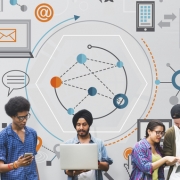Apps, Devices And The Cloud Transform Static Knowledge Into The Dynamic Practice Of Knowing.
What do you know? It’s a fundamental question for each of us as we navigate our way through an uncertain future of work. Until recently, we have tended to view knowledge as an object, a lump of information we carry in our brains. We used to think that the lump of information was mostly assembled during the educational years of our youth, and we carried the lump forward into the world of work. We emerged from that period with certificates to validate our own knowledge lump. Perhaps we added some experience to it over time, but that was polish on the surface more than additions to the core.
Lifelong Learning.
This attitude is undergoing significant change in today’s world. There is increasing recognition of the role of lifelong learning in navigating a career path or an entrepreneurial journey. A large part of the lifelong learning process is self-directed (although there are always experts and intellectuals around to write books and reports to tell you how it should be done). Self-direction is a vital navigational asset; the self-directed individual can make choices to accumulate knowledge in many fields at different points in life, as opposed to following a straight line of development dictated by an employer or professional body or a brick-and-mortar institution.
Technology, of course, is an influencer and enabler. The Web 2.0 concept of multi-sided platforms, user-generated content, dialogue and virtual communities is highly adducive to learning on the go. Online universities, online certification, digital badging and commercial applications like LinkedIn Learning all give testimony to the availability of learning at any time, in any place, and at any point in life.
From Knowledge To Knowing.
But there is one more step to go before we fundamentally change the use of knowledge in society. That is to shift our thinking about knowledge from a static object (albeit available for download at many different times during our life path) to an activity or a service. We have to learn to think not about knowledge but about knowing: knowledge-in-action, typified by continuous real-time knowledge acquisition and knowledge processing in daily life. This is a post-humanist perspective because devices, electronic storage and access / retrieval, as well as algorithmic analytics, change the nature of our relationship with knowledge. Knowledge is everywhere; it’s an ecosystem. It’s shared. Knowing is a practice at which we can each improve our capability. Digital entrepreneurs, through new knowledge practices, are creating new ways of developing, diffusing, and using knowledge and the new ways to generate and promote innovation.
Knowledge In Action.
As consumers of knowledge, we can no longer be passive. We must engage in the practice of knowing as a device-equipped actor. We can share information about ourselves to give the knowledge entrepreneurs more context, and enable them to deliver knowledge that is more meaningful to us. In return, we’ll get more comprehensive situational awareness, we’ll get better contextual knowledge extracted from the cloud of data, we’ll get help in crafting a thoughtful knowledge-in-use experience to clear away ambiguity and pinpoint the truth, and we’ll get help to make timely and informed decisions.
Books As A Service.
Books provide a very simple and basic example. Historically, books have been lumps of knowledge, physically delineated by their form. The printing press was, of course, a wonderful innovation and, combined with transportation, enabled the spreading of ideas across wider geographies and maybe even at faster speeds than had ever been the case before. Books didn’t change their form for hundreds of years, and neither did the practice of extracting knowledge from books.
Today, books are transformed into a knowledge service. They’re available in digital form, which provides infinite reach and open accessibility. They’re searchable, and can be digitally annotated so that the ideas they stimulate can also be captured and shared, and summarized and trended and analyzed. They can be downloaded into Kindle software that runs on multiple devices, and the content, as well as an individual reader’s notes and comments and highlights, can be shared. The written content can be transformed into audio, multiplying the number of times and locations for content consumption and learning.
A simple app like Blinkist opens up more dimensions of freedom to enjoy great books and great content. Blinkist offers a subscription service that enables users to search for books by title, author and theme. You can assemble your own library, start a wishlist, and keep your own highlights in one place. You can read online or buy a physical book or use audio. Blinkist also offers “blinks”, brief summaries of the book’s meaning and impact – why it’s important or useful or entertaining – so that you can assemble some summary “blinks” in your mind while pursuing a broader theme across multiple authors and their works.
Knowledge In The Socio-Technical Era.
These socio-technological innovations – the combination of humanism and technology and devices – are changing the nature of knowledge from knowledge-as-an-object to knowledge-as-a-service. The service is available to us for our entire lives, at every point in time and every place on the planet. Unlimited knowledge awaits us. Lifelong learning is a practice we can all embrace to tap that knowledge.
Full disclosure: If you subscribe to Blinkist by clicking the link in this post you should find a $20 off promotion, and you’ll be supporting Center For Individualism.




